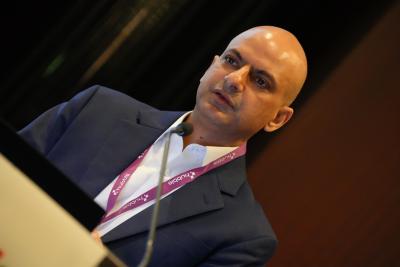Future Proofing the Client’s Investment Portfolio: Insurance Bonds as an Investment Platform

Graham Morrall of Hansard Global
May 27, 2022
Graham Morrall is Global Sales & Marketing Director at Hansard Global, which provides independent financial intermediaries and institutions with flexible, tax-efficient, long-term investment products within a life-assurance wrapper. He gave delegates an insightful 30-minute presentation at the Hubbis Middle East Wealth Management Forum on March 15, the first live conference Hubbis had hosted anywhere since early 2020, when the pandemic first struck. Armed with slides, Graham explained what Hansard Global does, and told them why robust life and other insurance bond solutions offer wealthy private clients ideal platforms through which to preserve and transition their assets, especially suiting the globally mobile individual and their family.
Graham Morrall, Global Sales & Marketing Director, Hansard Global
Key Pointers:
- Insurance is an extremely important part of the investment landscape
- Mobile individuals need flexible solutions
- Insurance is a robust and well-established proposition for private client wealth
Graham Morrall: “I represent an insurance group called Hansard. We have businesses all around the world in five different jurisdictions. Here in the UAE, we work with a local insurance company called Union Insurance, where we provide reinsurance services for their business. I want to talk to you a little bit today about future proofing your clients’ investment portfolio. I will focus specifically on what a high-technology insurance investment platform can do compared to any other investment platform.
I'm going to take you through some of the history of life insurance, and also some of the key benefits that you can take to your private clients.
Three core themes
I will focus on three core themes as well throughout my talk. First, insurance bonds are a large part of the investment landscape. Second, clients in this space are usually very mobile and often have assets, properties and family all around the world, so they need agility. Thirdly, they want peace of mind and security, so they need a robust, well-established, well-regulated environment for their wealth.
Historically, governments have always seen insurance as a benefit to society. Here in the UAE would be no different. Benefits that are provided by insurance companies and insurers can effectively substitute government-provided or state-financed benefits. Insurance in a society helps the mobilisation of savings, motivating people to save, motivating people to invest their money, as opposed to leaving it in the bank.
A conduit to a world of investment
Lastly, you'll find that governments really like insurers, because as that money comes into those insurers, so those insurers funnel their investment expertise to offer investors a highly efficient way to allocate capital throughout a country and across the globe. As a result of these advantages, policyholders have access to a number of benefits from that in the way of taxation and succession planning benefits.
A short story of a long history
It was back in 1583 that the first known life insurance policy was issued in London. Four years later, the policyholder claimed, but the insurer rejected it. The claim went to the courts, who upheld the claim. That was effectively the start of regulation l. As activity and regulation expanded over the centuries, so did the requirements for capitalisation and solvency, and the requirements for providing security for customers.
A plethora of solutions and jurisdictions
Today, there are numerous insurance policies in numerous jurisdictions, and there are solutions to suit each and every client. Insurers do not simply offer basic protection, they go all the way through to estate and wealth management solutions. For example, there are savings/investment policies being written mostly on a life insurer’s balance sheet or a mutual insurer. In the late 20th century, you saw the arrival of unit linked insurance, then a growing range of in-house funds from life insurers
In short, the industry has transitioned from protection into the realms of wealth management, and that continues to this day.
Technology and open architecture
“Every insurer involved in this business really has great technology and open architecture platforms available for clients in any field, be they retail, high net worth, or even, ultra-high net worth individuals. It's quite incredible now what we have available, and you get all of that tech, and all of those pieces of flexibility with additional benefits, which you won't get if you're just using a fund platform with no insurance.”
We now have multiple sectors, we have multiple currencies, we have 24/7 access for clients and their advisors, their administration, it is a wonderful and fully digitised investment ecosystem.
Flexible to the core
I mentioned mobility, and clients that you look after needing flexibility and solutions that are truly global, as opposed to just domestic. I am guessing that most people in this room today were born somewhere else. In the world of business and finance today, there's very few people that we come across in our business lives that are based where they were when they started out.
There's been a huge interest around people's residency, nationality, and passporting. With the horrific events in Ukraine now, then obviously those types of things will increase, and so do the requirements for these types of clients.
Growing apace
In brief, clients need to have flexible solutions that can be relied upon. The use of insurance bonds is extremely pronounced in the international markets. Some research conducted by a company called NMG for the Association of International Life Offices underscores that remarkable activity, and it has grown dramatically in recent years.
Here in the UAE, insurers have perfectly good options for a number of your clients but those clients that have this very wide global requirement are probably going to look for something more international, with a brand and with security, capitalisation and solvency.
Not a taxing decision
As I mentioned, tax treatments are appealing. Life fund taxation is usually beneficial in the country that a policy holder is based in, and there is usually plentiful opportunity to defer tax. There is also an opportunity to compliantly sidestep taxes of certain sorts within the product as a result of the regulations or the laws in those particular countries.
As insurance is deemed a benefit to society, there are benefits in terms of this type of preferential tax treatment. Essentially, from the UK perspective, for example, there are income tax benefits, there are capital gains benefits, there are tax deferral benefits, time apportionment, top slicing relief, so to sum up, there are many ways of using an insurance bond to end up with a better tax position for your client. There are other tax advantages in other jurisdictions. For example, in France you can use these products to transition outside of punitive wealth taxes.
Take the right advice
I'm not an expert in tax, but over at QB Partners they have access to tax experts, and we have a retainer relationship with them to help us to help wealth managers with their private clients on a generic basis.
Another valuable advantage of using an insurance policy as opposed to a fund platform comes in relation to estate and succession planning. In fact, insurance companies have been providing this service for payments in and out. In pretty much every policy from almost every insurer around the world, we use something such as a beneficiary appointment, which is a low-cost way of ensuring that money from an insurance policy goes to the right beneficiary without having to spend money on things like trusts or foundations or companies.
Now, I'm not saying that trusts, foundations or companies don't have a place in all of this. But if you have a very simple requirement from a customer, then the insurance world has a very simple solution in terms of succession planning with all of the other benefits provided by fund platforms.
A healthy array of advantages
So, in summary, insurers and insurance bonds have amazing technology, they have open architecture, they can purchase assets in a very similar way to any other fund platform on the planet. In addition to that, they have some very real benefits from tax deferral and tax mitigation. You have the ability to look at cross-jurisdictional flexibility, choosing which part of the world perhaps you might prefer in terms of the security of assets for your customer.
In conclusion, I would say to you that as wealth managers, if you're not already looking at insurance bonds as an investment platform, and if you are not yet considering some of the additional benefits that they offer to you and your clients, then perhaps you should. Our door is open…”

Global Sales & Marketing Director at Hansard Global







